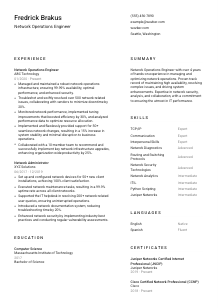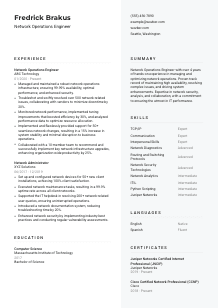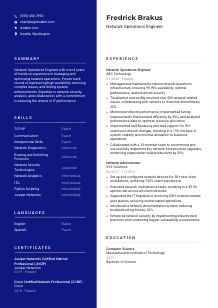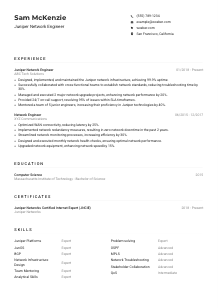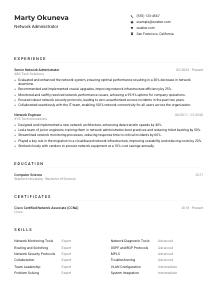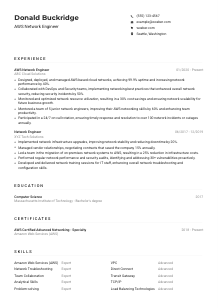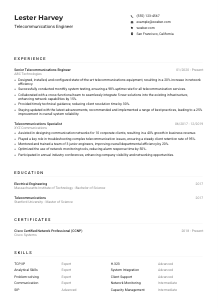Network Operations Engineer Resume Example
Keeping networks running smoothly, but your resume seems to have signal issues? Dive into this Network Operations Engineer resume example, optimized with Wozber free resume builder. Discover how you can align your connectivity know-how with job requirements, ensuring your career path stays as solid as your Wi-Fi connection!
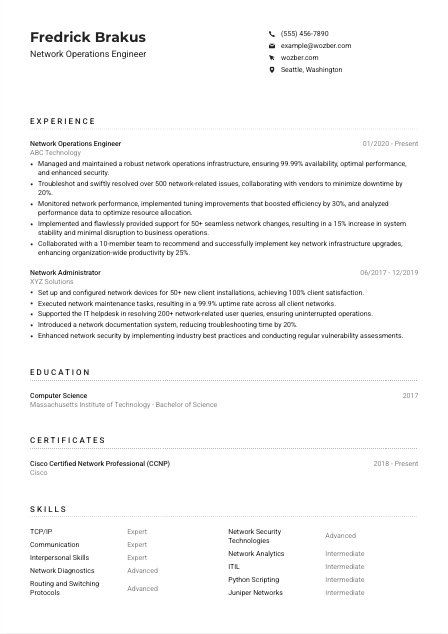
How to write a Network Operations Engineer Resume?
Hello, aspiring Network Operations Engineer! If you're aiming to make your mark in this competitive field, you know that a standout resume isn't just helpful—it's crucial. This guide, empowered by Wozber's free resume builder, is your roadmap to crafting a resume that not just meets but exceeds what hiring managers are seeking for a Network Operations Engineer role.
Get ready to dive deep into the world of network operations, ATS optimization, and how to make your resume not just seen, but remembered. Here we go!
Personal Details
In the world of Network Operations Engineering, first impressions count, starting with your Personal Details. This section, though brief, plays a pivotal role in hooking the recruiter's attention. Let's refine it to make you stand out from the very first line.
1. Make Your Name the Brand
Think of your name as the headline of your professional story. Use a clear, bold font that declares, "Here I am." In network operations, clarity and presence are key, and it starts here.
2. Aligning with Your Role
"Network Operations Engineer" isn't just a job title; it's your professional identity. Placing it prominently on your resume directly below your name matches you immediately with the role at hand, telling the hiring manager, "This is who I am and what I do."
3. The Must-have Contact Info
In the digitized realm of Network Operations, your contact information must reflect your professionalism. A sleek, professional email address, easily accessible phone number, and optional LinkedIn profile or personal website can make connecting a smooth, one-click process.
4. Location, Location, Location
Being in Seattle, Washington is not just about geographic convenience; it signals to your potential employer that you're ready and able to dive into the local network operations scene without the complications of relocation. Mention it clearly.
5. Skip the Extras
Personal details like age or marital status are extraneous in the high-tech world of Network Operations Engineering. Your skills and experiences are the stars of this show.
Takeaway
Your Personal Details are more than just the basics; they're the first handshake with your future employer. Make it confident, clear, and focused on what matters most: your compatibility with the Network Operations Engineer role. With these tips, you're not just another applicant; you're a distinct professional stepping into the spotlight.





Experience
In Network Operations Engineering, your experience is your currency. It's where you demonstrate not just what you've done, but how you've excelled. Let's fine-tune this section to showcase your achievements and align them precisely with what recruiters are searching for.
- Managed and maintained a robust network operations infrastructure, ensuring 99.99% availability, optimal performance, and enhanced security.
- Troubleshot and swiftly resolved over 500 network‑related issues, collaborating with vendors to minimize downtime by 20%.
- Monitored network performance, implemented tuning improvements that boosted efficiency by 30%, and analyzed performance data to optimize resource allocation.
- Implemented and flawlessly provided support for 50+ seamless network changes, resulting in a 15% increase in system stability and minimal disruption to business operations.
- Collaborated with a 10‑member team to recommend and successfully implement key network infrastructure upgrades, enhancing organization‑wide productivity by 25%.
- Set up and configured network devices for 50+ new client installations, achieving 100% client satisfaction.
- Executed network maintenance tasks, resulting in a 99.9% uptime rate across all client networks.
- Supported the IT helpdesk in resolving 200+ network‑related user queries, ensuring uninterrupted operations.
- Introduced a network documentation system, reducing troubleshooting time by 20%.
- Enhanced network security by implementing industry best practices and conducting regular vulnerability assessments.
1. Decode the Requirements
Break down the job description to understand what the employer values most. For a Network Operations Engineer, this means spotlighting your hands-on experience in maintaining infrastructure, troubleshooting, and enhancing system performance.
2. Present with Structure
Chronology is key, starting with your most recent role. But it's not just about when you did something; it's about showcasing the impact. List your role, the company, and the date—then delve into how you made a difference.
3. Achievement-led Statements
Each bullet point is a story of success. "Managed and maintained a robust network operations infrastructure" is more than a task; it's proof of your ability to ensure reliability and performance under pressure.
4. Quantify Your Impact
Numbers speak volumes. A "30% efficiency boost" or "resolving over 500 network-related issues" provides tangible proof of your contributions. Make your successes measurable and your expertise undeniable.
5. Relevant Expertise Only
Your time as a coffee-making intern might have been enlightening, but focus your resume on the experiences that speak directly to network operations. Prioritize relevance to show you're not just experienced—you're exactly what they're looking for.
Takeaway
Your Experience section is where you shine as a Network Operations Engineer. It's not just about what you've done; it's about illustrating the impactful, tangible difference you've made. With each line, convince the hiring manager that you're not just fitting into the role, you're elevating it.
Education
In the fast-paced, technical world of Network Operations Engineering, a solid educational background provides the framework for your skills and knowledge. Here's how you can sculpt your Education section to align perfectly with the job's requirements.
1. Identify the Essentials
The job calls for a "Bachelor's degree in Computer Science, Information Technology, or a related field." This isn't just a requirement; it's a benchmark of your foundational knowledge in network operations.
2. Structure Matters
Present your educational achievements clearly. Start with the degree, followed by the field of study, institution name, and graduation date. This isn't just a list; it's a timeline of your academic pursuit in the realm of Network Operations.
3. Degree Specifics
If you have the degree that's directly aligned with the job, highlight it! "Bachelor of Science in Computer Science" isn't just a degree; it's evidence of your dedication and relevance to the field of network engineering.
4. Relevant Courses
For those early in their career or lacking extensive experience, emphasizing relevant coursework can bridge that gap. It shows your focused education trajectory towards becoming a Network Operations Engineer.
5. Beyond the Degree
Participation in tech clubs, relevant projects, or academic honors can add depth. While they may not replace job experience, they reinforce your commitment and passion for network operations.
Takeaway
Your education is more than a list of schools and degrees; it's a narrative of your journey into network operations engineering. Tailor this section to not just meet but exceed expectations, showing that your academic credentials are perfectly aligned with the role you're aiming for.
Certificates
In the realm of Network Operations, staying current through certifications is just as important as your foundational education. Certifications like CCNP or JNCIP don't just add to your resume; they speak volumes about your commitment to growth and excellence in the field. Let's highlight them in the best possible light.
1. Spotlight the Essentials
Given the role's specifics, certificates like "Cisco Certified Network Professional (CCNP)" or "Juniper Networks Certified Internet Professional (JNCIP)" aren't merely bonuses—they're essential indicators of your expertise and readiness to excel.
2. Quality over Quantity
Your resume isn't a place to list every certificate you've ever earned. Focus on those that matter most for a Network Operations Engineer role. Make each one count by showing relevance and readiness.
3. Date Matters
Including the date of acquisition, especially for recent certifications, underscores your ongoing commitment to your professional development. It shows you're not just keeping up—you're pushing forward.
4. Keep Evolving
Network technologies are always changing, and so should your knowledge. Emphasize your dedication to staying ahead of the curve, not just for the role you're applying for but as a commitment to your career in network operations.
Takeaway
Your certificates are a testament to your dedication to professional growth and your prowess in Network Operations. Highlight them not as mere credentials, but as reflections of your quest for excellence and readiness to tackle the complexities of network operations head-on.
Skills
For a Network Operations Engineer, technical aptitudes are imperative, but soft skills like communication and collaboration cannot be understated. This segment of your resume is where you can showcase the balance of expertise and interpersonal skills essential for the role.
1. Extract from Job Description
Scan the job description for both hard and soft skills. Terms like "network diagnostic," "TCP/IP," and "excellent communication" aren't random; they're clues to what the employer prioritizes.
2. Prioritize Direct Matches
Focus first on skills directly mentioned in the job description. This alignment not only shows you're a great fit but also helps your resume pass through ATS filters more effectively.
3. Stay Concise yet Comprehensive
While it's tempting to list every skill in your arsenal, prioritize those that truly resonate with the role of a Network Operations Engineer. Your aim is precision—a focused showcase of how your skills align perfectly with the job's requirements.
Takeaway
Accentuate skills that align you not just as a qualified candidate, but as the answer to what the hiring manager is looking for. Your skills section is your pitch; make every word count to demonstrate your unmatched fit for the role of Network Operations Engineer.
Languages
In an increasingly globalized world, your ability to communicate in multiple languages can be a distinct advantage, especially when troubleshooting network issues across borders or collaborating with international teams. Let's ensure this section reflects your linguistic competencies effectively.
1. Match the Job Requirement
"Must demonstrate proficiency in English." Directly aligning your language skills with the job's requirements showcases your ability to not only fit but excel in a role where clear communication is key.
2. Prioritize Relevant Languages
While English might be paramount, other languages can emphasise your capability to work in a diverse, global environment. Specify your proficiency level to provide a clear understanding of your abilities.
3. Other Language Skills
Even if additional languages are not specified in the job description, they can still add value to your resume. Being multilingual can position you as a versatile asset in an interconnected world.
4. Honesty in Proficiency
Accuracy in depicting your language proficiency is crucial. Whether you're "native," "fluent," or "intermediate," your honesty sets the tone for reliable communication and trustworthiness in the workplace.
5. Gauge the Role's Reach
Understanding the global scope of the Network Operations Engineer role can help you tailor this section more effectively. Even if the immediate role doesn't require additional languages, showing your capability to navigate diverse settings can be a significant asset.
Takeaway
Your linguistic skills are not just personal achievements; they're professional assets that enhance your adaptability and connectivity in a global market. Highlighting your language skills is not just about showing diversity; it's about demonstrating your capacity to bridge cultures and networks effortlessly.
Summary
The Summary is your moment to encapsulate your professional identity as a Network Operations Engineer. It's where you distil your experiences, skills, and ambitions into a narrative that resonates with hiring managers, inviting them to delve deeper into your resume.
1. Digest the Job Description
Start by understanding the essence of the role. Words like "manage and maintain network operations infrastructure" paint a picture of what's expected and guide how you should reflect on your own experiences.
2. Frame Your Introduction
Begin your summary with a crisp statement that positions you as a seasoned Network Operations Engineer, ready to elevate the network infrastructure with your insights and expertise.
3. Highlight Matching Skills and Achievements
Cherry-pick achievements and skills that directly match the job description. Succeeding in crafting a summary that echoes the responsibilities and requirements signals to recruiters that you're not just a fit; you're the candidate they've been searching for.
4. Keep It Tight
Your summary is the elevator pitch, not the entire meeting. Aim for 3-5 compelling lines that invite the hiring manager to learn more about how you can contribute to their network operations success.
Takeaway
Crafting a compelling summary isn't just about listing qualifications; it's about storytelling. It's your opportunity to weave your professional identity into the narrative of the Network Operations Engineer role. Make this section the doorway to your resume, inviting recruiters to step in and discover the full extent of your capabilities and potential.
Launching Your Journey
Congratulations on fine-tuning your Network Operations Engineer resume! Remember, every adjustment, every word you've crafted, aligns you closer to your goal. Your resume is more than a document—it's a testament to your skills, dedication, and aspiration. Harness the power of Wozber's free resume builder, its ATS-friendly resume templates, and its ATS resume scanner for keywords optimization, and let your resume be your ambassador.
The network operations landscape awaits your expertise. Ready to connect? Your next great opportunity is just a submission away.

- Bachelor's degree in Computer Science, Information Technology, or a related field.
- Minimum of 3 years of hands-on experience in network operations or related roles.
- Proficient in network diagnostic, network analytics, and network operating systems.
- Strong understanding of TCP/IP, routing and switching protocols, and network security technologies.
- Excellent communication and interpersonal skills to collaborate with cross-functional teams.
- Possess or willing to obtain industry-standard certifications such as CCNP or JNCIP.
- Must demonstrate proficiency in English.
- Must be located in Seattle, Washington.
- Manage and maintain network operations infrastructure, ensuring availability, performance, and security.
- Troubleshoot and resolve network-related issues in a timely manner, collaborating with vendors if necessary.
- Monitor network performance, implement tuning improvements, and analyze performance data.
- Implement and provide support for network changes, ensuring minimal disruption to business operations.
- Collaborate with team members and stakeholders to recommend and implement network infrastructure upgrades and enhancements.





